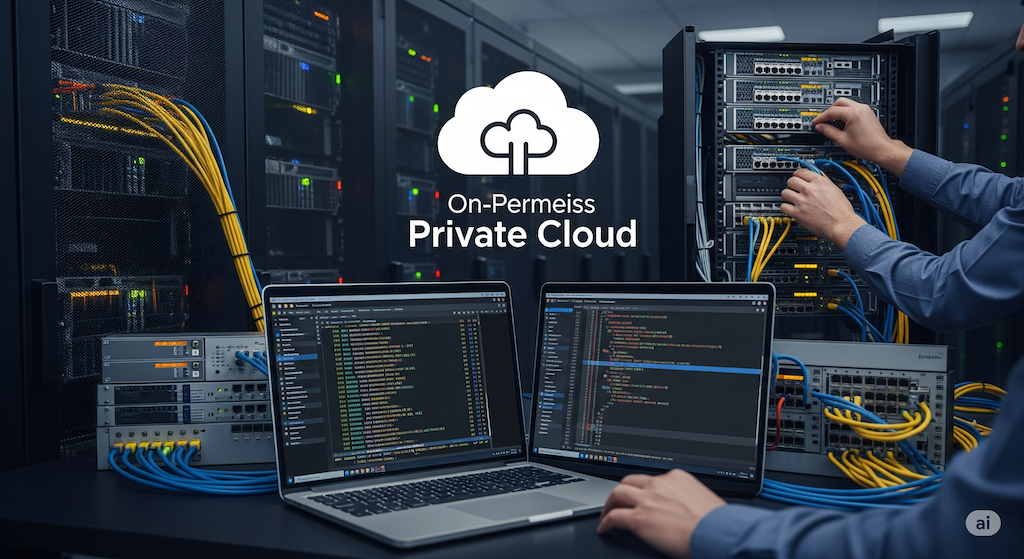DevOps in the private cloud: Mastering the skills for the on-premise landscape

Private cloud is growing (again)!.
According to industry statistics private cloud market will grow from USD 124 billion in 2024 to USD 190 billion in 2029.
What does it mean for DevOps engineers?
There will be more DevOps jobs demanding private cloud skills.
DevOps skills for the private cloud
At its core, the principles of DevOps—collaboration, automation, continuous integration, and continuous delivery—remain the same whether you're in the public or private cloud.
But, the application of these principles and the tools required to achieve them can vary significantly in a private cloud environment because private cloud lacks elasticity and abstraction of the public cloud.
In the public cloud, you can scale resources up or down on demand, and many infrastructure components are managed services. In a private cloud, you are responsible for the underlying hardware and much of the software stack. This means:
- Limited Elasticity: You don't have the "infinite" scalability of the public cloud. Capacity must be planned and procured upfront.
- Less Built-in Automation: Infrastructure as Code (IaC) tools aren't always readily plug-and-play. You often need to build your own toolchains and integrate various components for comprehensive automation.
These differences necessitate a distinct set of skills for DevOps engineers working in private cloud environments. Let's see what these skills are:
Skill #1: Upfront capacity planning skills
In the public cloud, you can provision resources as needed.
In a private cloud, this isn't an option. DevOps engineers need strong capacity planning skills to forecast future needs, procure the necessary hardware, and avoid both over-provisioning (leading to unused capacity and wasted investment) and under-provisioning (leading to performance bottlenecks and outages).
This involves understanding application requirements, user growth projections, and hardware lifecycle management.
Skill #2: IaC in private cloud needs a different set of tools
IaC is fundamental to DevOps whether it's private cloud or public cloud.
But the IaC tools and approaches differ significantly in a private cloud. Public cloud providers offer their own IaC solutions (e.g., AWS CloudFormation, Azure Resource Manager). In a private cloud, you'll be working with tools that interact more directly with virtualization platforms (like VMware vSphere, OpenStack), bare-metal servers, and network devices.
You need to leverage tools like Ansible, Puppet, Chef, Terraform (with custom providers), or even custom scripting to achieve infrastructure automation. The abstraction layer is thinner, requiring a deeper understanding of the underlying infrastructure.
Skill #3: You need more hands-on experience with Linux
Public clouds abstract away much of the underlying operating system management.
In a private cloud, you are directly responsible for provisioning, configuring, and managing the Linux operating system on your servers. This includes everything from kernel tuning and package management to troubleshooting system-level issues. A strong proficiency in Linux commands, scripting (Bash, Python), and system administration is indispensable.
Skill #4: Networking is a crucial skill in private cloud
In the public cloud, networking is largely a managed service. You just need to configure virtual networks, subnets, and security groups, and things will work.
Not so in the private cloud.
In a private cloud, you're responsible for the networking hardware. You will be provisioning routers, switches, load balancers, firewalls, etc., to setup network connectivity. A deep understanding of TCP/IP, VLANs, routing, and network security is critical for designing and maintaining a robust private cloud environment.
Skill #5: Security is paramount like in the public cloud, but implementation is different
Security is always a top priority, but the scope of responsibility shifts in a private cloud.
In the public cloud, the cloud providers are responsible for the security of the cloud, you are only responsible for security in the cloud, including the operating system, applications, and data.
In a private cloud, your responsibility extends to the underlying cloud infrastructure itself, including host OS security, network segmentation, firewall rules, and physical security measures. You also won't have access to the same suite of managed security services, requiring you to build security controls from the ground up, implement intrusion detection systems, and manage security updates manually.
Skill #6: Managing backups is quite different in private clouds
Public cloud providers offer robust and often automated backup services.
In a private cloud, you are solely responsible for designing, implementing, and managing your backup strategy. This includes selecting backup software, provisioning storage for backups, scheduling backup jobs, and ensuring data integrity and recoverability.
If ransomware protection or specific data immutability requirements are needed, you'll have to bring and integrate the necessary tools and solutions yourself.
Skill #7: Disaster recovery needs more planning in the private cloud
Disaster recovery (DR) in the public cloud often involves leveraging regional availability zones and automated failover mechanisms.
In a private cloud, your DR strategy requires extensive upfront planning and investment. You need to build and maintain a separate DR site with sufficient capacity, establish replication mechanisms, and regularly test your DR plan. This involves meticulous planning for infrastructure, data synchronization, and application failover, making it a far more hands-on and resource-intensive endeavor.
Wrapping up
While the core philosophy of DevOps remains universal, the practical application and required skill sets in a private cloud environment demand a deeper, more hands-on understanding of underlying infrastructure.
With the projected growth in private clouds, we can expect more DevOps roles seeking the said private cloud skills.
So...... let's be prepared.

